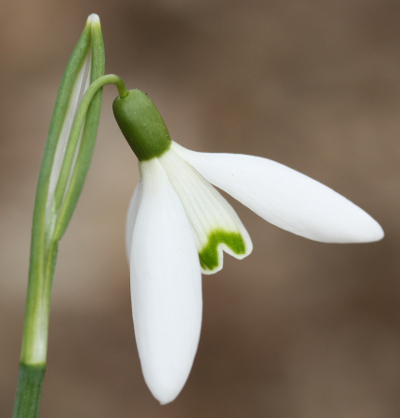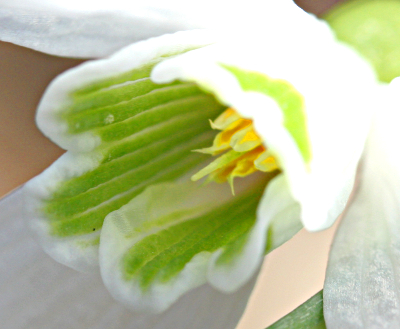Common snowdrop |




The
inner tepals of the snowdrop on the outer side show a green v-shaped
mark and green stripes inside.
further, a bud and a leaf is
shown
| Galanthus nivalis L.: | |
| Blooming period: | February–April |
| Height: | 15–20 cm |
| Flowers: | bisexual, radiate, white, conspicuous, stamens: 6, styles: 1 |
| Tepals: | 6, white, outer tepals: 3, large; inner tepals 3, short |
| Leaves: | 2, basal, parallel-veined |
Plant perennial, herbaceous with an about 1 cm thick, black bulb.
Scape erect, above with a bract.
Leaves 2, basal, 5–7 mm wide, gray- or blue-green, about as long as the scape.
The drop-shaped bud is covered before anthesis by a bract and breaks through this in the further development.
Each scape only with one nodding flower with a 2 cm long stem.
Outer tepals pure white, elliptical, obliquely spreading, 1.5–2 cm long.
Inner tepals 3, overlap and form a tube, half as long as the outer tepals, exterior with green, v-shaped marks, interior striped green.
After insect pollination capsule fruits are formed by the inferior ovary.
The seeds have a nutrient-rich appendage (elaiosome) and are spread by ants.
Propagation also by formation of daughter bulbs. Plants highly variable. Toxic, especially the bulb!
| Floral formula: |
| * P3+3 A3+3 G(3) inferior |
Occurrence:
Deciduous
forests, gardens. Prefers calcareous, slightly moist and nutritious
soils.
Distribution:
Originally
eastern and southern Europe and southern Germany. By cultivation also
in northern Europe and North America. Sometimes occur feral populations.